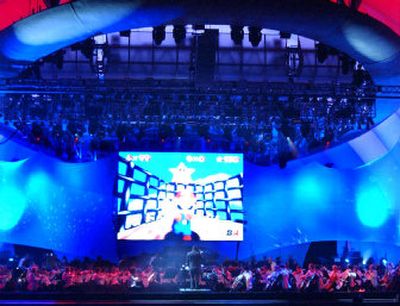Video game music gets serious

LOS ANGELES — Violinists playing sweetly beneath her, the video game heroine Lara Croft has two guns blazing and the full attention of 10,000 people at the Hollywood Bowl.
The animated star of “Tomb Raider” games, which have collectively sold more than 30 million copies, unflinchingly braves explosions on a giant TV screen that hangs, incongruously, above the Los Angeles Philharmonic orchestra at the bizarre yet beautiful debut performance of Video Games Live.
The spectacle, which promoters say will be performed by similarly topflight orchestras in more than 15 cities in coming months, is just the latest sign that songs written for the interactive gaming world are blasting out of consoles and into the mainstream.
Orchestra concerts of music from “Final Fantasy” games — a long-running role-playing series with a cult-like following — have sold out venues nationwide.
Video games are now attracting serious composing talent. Award-winning film composers such as Danny Elfman of “Charlie and the Chocolate Factory” and Howard Shore of “The Lord of the Rings” trilogy have written music for games. Shore recently completed work on the upcoming “SUN,” an online role-playing game set in a medieval world of emperors and monsters.
And hit singles such as Green Day’s “American Idiot” were heard on the hugely popular “Madden NFL Football” games even before they got radio play. In fact, 14 of the 21 songs in the game’s latest version, released last week, are previously unreleased.
It’s all a sonic leap from the blips and beeps of “Pong” and “Asteroids.”
“The music in video games is basically maturing to the spot where it can live outside” of gaming systems, said Chuck Doud, music director for Sony Computer Entertainment.
Like movie scores, game soundtracks seldom top the charts, though a few have been big sellers.
The score from “Halo 2,” an Xbox game that pits players against alien invaders, has sold about 100,000 copies since its release late last year. Sales of the “Final Fantasy: The Spirits Within” soundtrack have reached 47,000 copies since being released in 2003, according to Nielsen SoundScan.
Video game music’s growing popularity is being driven by budgets that can now reach hundreds of thousands of dollars, spending that has climbed along with overall industry revenue.
In the United States, video game industry sales now exceed movie box office receipts. “Halo 2” generated more than $125 million in sales on its first day alone.
Composer Tommy Tallarico, co-creator of Video Games Live, says his music budget was about $300,000 for “Advent Rising” — the first game in a planned intergalactic trilogy with dialogue and stories by science fiction writer Orson Scott Card.
Orchestras and choirs recorded Tallarico’s 13th century Italian opera-inspired songs on a stage at the Paramount Pictures lot.
“In movies, you write to picture, you write to the scene, and it’s considered background music,” said Tallarico. “I consider us foreground music.”
Maybe, just maybe, it’s enough to keep people listening after spending dozens of hours playing a single game.
“That’s what you’re striving for, is to have the player hold off muting the music,” said Garry Schyman, who composed an hour of 1950s sci-fi movie-style music for the alien invader game “Destroy All Humans!”
Schyman has also written scores for small films, documentaries and TV movies. Now he’s anxious for more video game work.
“I had a blast,” he said. “Plus, it pays well. They have the money for orchestras. Television these days rarely has money for orchestras.”